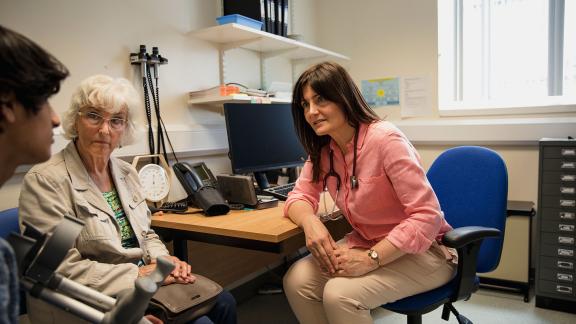NHS procurement: strategy or just shopping?

It’s now four months since I took over as interim chair of NHS Supply Chain and I have been reflecting on the world of NHS procurement, where it has come from and where it might be going.
I am old enough to remember a range of approaches to ‘supplies’, as we used to refer to it. As a junior nurse, one of the tasks I had was to undertake the ward stocktake. It helped fill an otherwise boring Sunday afternoon and got me out of the weekend cleaning. I can’t imagine that any clinical staff these days have any downtime that needs filling on Sundays, or any other day.
There was the introduction of regional distribution centres, a switch to ward-level top-up systems and restrictions put on representatives to stop them from taking you out for lunch. But realistically, as a clinician and later as a manager, I didn’t give procurement much thought. We had the items we needed, not least because everyone had a secret hoard just in case. We didn’t think about what they cost, where they came from or who got them for us. In the same way a surgeon and their scrub nurse work together, you put your hand out and whatever you needed was there.
A strategic and cross-cutting issue
Many years later as a chief executive of a large trust, I became much more interested in the world of procurement internally, across the system and nationally. This was driven by my involvement in establishing and hosting an academic health science network, running one of the national test beds in collaboration with multiple industry partners, and looking for opportunities to improve efficiency in non-pay spend.
However, notwithstanding my personal interest, on reflection, I never thought about discussing our overall approach to procurement with my board as a key strategic and cross-cutting issue. My chief financial officer (CFO) and I were interested in how we shopped, what we bought and from whom, but didn’t think of it more broadly.
Even three years ago when I first joined NHS Supply Chain and talking with chief executive colleagues about what we were doing, in many cases I got the same sort of reaction that technology pioneers used to get: “Anything about IT….talk to my IT director.” In this case the response was “the board won’t be interested but my head of procurement and my CFO might be”.
Supply chain resilience
What a difference two years can make. A global pandemic plus EU-Exit, plus sustainability, have certainly had an impact.
The increased importance sustainability issues and ethical procurement is raising new questions about sourcing strategies
The past two years have been incredibly challenging for everyone; in no way am I trivialising the human cost of that. However, it has also demonstrated some of the fragility and risk of shopping when the whole world is trying to buy the same things at the same time.
Suddenly supply chain resilience was really challenged and was having a direct effect on clinical risk and practice. The financial impacts of increased costs of raw materials, workforce and logistics is adding pressure to the economy, both within the NHS and more generally.
The increased importance and awareness of sustainability issues and ethical procurement is raising new questions about sourcing strategies alongside the changes in legislation regarding social value. If you add in the need for transformation of pathways, innovation to improve patient outcomes and safety and post-COVID-19 recovery, at a time when the workforce is exhausted and stretched, then it’s clear to me that procurement can have a massive role to play.
Wider determinants of health
Integrated care systems are uniquely placed to develop a more strategic approach to procurement
If these things don’t raise the profile of procurement within NHS boards and systems as a strategic issue worthy of discussion, then I am not sure what will.
The emerging integrated care systems are uniquely placed to develop a more strategic approach to procurement across bigger populations across the whole of health and social care, ensuring not just quality, safety and efficiency but delivering enhanced value and better health and wellbeing.
An important priority for each ICS is to improve life expectancy and tackle some of the wider determinants of health. We know that better educational attainment and employment plays a key role in that. Within NHS Supply Chain, we can use our national position to help stimulate job creation locally and at a scale that makes it viable in the longer term and we are looking at how we can do this.
More than just shopping
At a national level across NHS Supply Chain and government more widely, there are lots of very exciting and constructive discussions and plans to enable a shift to value-based sustainable procurement. Now more than ever there is a collective understanding across the whole NHS of how we can all support climate change and NHS Supply Chain will play a leading role going forward.
The conversations are also about deeper partnership working, supporting clinically-led transformation, securing resilience and cost effectiveness through collaborative world-class procurement. We are exploring what our contribution can be, as the NHS procurement organisation nationally, to help address the workforce, safety, productivity, recovery and health inequalities challenges that trusts and systems are facing locally. Together we can achieve so much more.
While the NHS depends on procurement of high-quality and safe products with transactions made, from my perspective, it’s so much more than just shopping.
When was the last time your board discussed procurement and its role in your strategy for improving health outcomes?
Heather Tierney-Moore OBE is interim chair at NHS Supply Chain.
Join the discussion
Join Heather and a panel of experts on 16 February to consider patient safety in healthcare products and services. Book your place.



